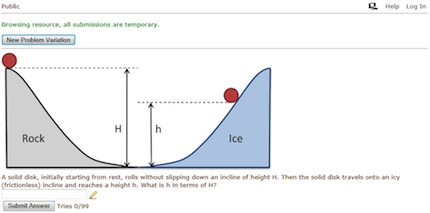DIstance Ed | News
MIT Prof Offers Free Online Intro to Newtonian Mechanics
- By Dian Schaffhauser
- 06/18/12
MIT Professor of Physics David Pritchard is running a free online physics course this summer to help teachers and students brush up on their knowledge and for anybody else interested in learning about Newtonian mechanics. The first quiz for "Mechanics Online" will be due June 29, and the course runs through Aug. 24.
Pritchard's research group, Research in Learning, Assessing and Tutoring Effectively (RELATE), piloted the same course as part of a project to explore student learning and the development of expert skills. It uses a problem-solving pedagogy that integrates instruction, assessment, and interactions with other students. The course features a modularized etextbook, videos, simulations, and problems. In weekly online office hours, the instructor will explore questions prioritized through crowdsourcing.

MIT Mechanics online sample problem |
The course is being run in an environment created by RELATE on an open source learning management system, LON-CAPA, which first appeared in 1992 and was tested in a physics class.
While the target audience is physics teachers and their "accomplished students," the researchers are making the course available to those with knowledge of mechanics.
On top of that, all of the materials used for the class are being made available to teachers who sign up to use LON-CAPA. A sampling of activities is available on the home page of the course. Course alumni and instructors using LON-CAPA will be able to get help and advice via a social network run by Gerd Kortemeyer, director of LON-CAPA.
People who complete the course will receive a letter of completion from Pritchard. Educators pursuing continuing education credits who finish the class can obtain those unit credits for a fee through the American Association of Physics Teachers.
About the Author
Dian Schaffhauser is a former senior contributing editor for 1105 Media's education publications THE Journal, Campus Technology and Spaces4Learning.

